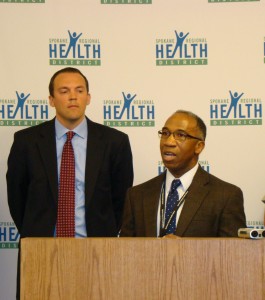 On Tuesday, Representative Marcus Riccelli (D-Spokane) and a group of elected officials, law enforcement officers and health experts took a tour of the Spokane Regional Health District’s bioterrorism lab, which played a critical role in protecting public health during the ricin incident earlier this month. Afterwards they held a press conference to speak about the future of the lab in the face of potentially crippling budget cuts.
On Tuesday, Representative Marcus Riccelli (D-Spokane) and a group of elected officials, law enforcement officers and health experts took a tour of the Spokane Regional Health District’s bioterrorism lab, which played a critical role in protecting public health during the ricin incident earlier this month. Afterwards they held a press conference to speak about the future of the lab in the face of potentially crippling budget cuts.
The message? It’s time to get serious about funding.
It’s an alarm that Riccelli has been sounding even before the laboratory successfully analyzed specimens from the May 16 incident and determined that they were laced with ricin toxin. Since entering office he has been an advocate for securing funding to keep the facility open.
During a hearing in the House Healthcare Committee, Riccelli raised concerns to the new Secretary of Health John Wiesman about what closing the bioterrorism laboratory would mean for public health and public safety in Eastern Washington. Following that he led a bipartisan group of legislators in writing a letter urging the Department of Health to provide additional funding to prevent the lab from closing.
The press conference itself came after an exchange between Riccelli and the Public Health Director of the Spokane Regional Health District, which revealed the ricin incident could have played out quite differently if the bioterrorism laboratory was not in operation. Without that facility, the nearest lab that could test for ricin would have been in Shoreline, Washington. Between special packaging, travel and processing, it could have been ten hours before the results were known. For Riccelli, that was unacceptable.
The press conference brought together leaders from all different communities who understood the importance of the laboratory in preserving safety and public health for residents of Spokane and all of Eastern Washington. Rep. Riccelli will continue to work with these advocates to ensure that every effort is made to find funding to keep the lab open.
For additional information about the Spokane Regional Health District’s bioterrorism lab, check out this fact sheet discussing its capabilities and the consequences of closure.
